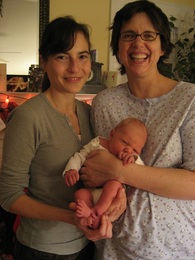Postpartum Support

Photographer: Joe Conley
What are my options?
The days and weeks following the birth of your new baby may be exhilarating, and exhausting. In today’s world, where families don’t always live near one another, new parents haven’t necessarily been exposed to the daily care of an infant, and there is conflicting parenting advice coming from all sides, for some, it can feel confusing and overwhelming. It may take some time to get comfortable with feeding and caring for your new baby, find sleep routines that work for your family, choose a pediatrician who supports your values, and find like minded parents for support and encouragement, all while you and your partner adjust to your new roles as parents, get to know your new family member, and physically heal from the birth. This period can be extra challenging if you’ve experienced a difficult or traumatic birth, are having breastfeeding struggles, or an especially high-needs baby.
Fortunately there are several excellent options for support after you have your baby available in the DC metro area, ranging from the hands-on help a doula can provide, to a variety of moms’ groups, to facebook groups and listservs for new parents to find community.
Birth Options Alliance offers a variety of resources to support parents after the birth or adoption of a baby, including:
New Parent Support in the DC Metro Area
Postpartum Doulas in the DC Area
Directory of Mental Health Support for the Childbearing Year
Pregnancy and Baby Loss Support
Breastfeeding Resource List
Complementary and Alternative Providers List
What is a postpartum doula?
A postpartum doula provides non-judgemental emotional and hands-on support to the new family in the first weeks and months following the birth. A postpartum doula nurtures families as they gain confidence in caring for their baby, and helps with practical needs so the new parents can focus their energy on bonding with their baby, and recovery from the birth. Learn more about what postpartum doulas do, here.
There are several organizations that train and certify postpartum doulas, two of which are DONA and CAPPA. Doulas do not have to be certified in order to practice; there are many excellent postpartum doulas who have years of experience who have not chosen to go through a certifying organization, just as being certified does not guarantee an excellent doula! You will want to discuss any potential doula’s experience, qualifications, and services they provide during a thorough phone or in-person interview. It’s important to be sure you’re a good match when inviting someone into your home at such an intimate time in your life!
Services that doulas provide may include:
• Answering parents' questions about infant behavior and characteristics.
• Modeling for new parents practical care of the baby, including bathing, diapering, and baby carriers.
• Providing empathy and a listening ear as new parents process the birth experience and adjust to life with a baby
• Infant feeding support and breastfeeding expertise
• Meal preparation
• Light housekeeping, household organizing, and errands
• Connecting you to resources in your community (mom and baby classes, new parent support groups)
• Providing referrals to professionals that you may need (lactation consultants, massage therapists, help finding childcare)
• Prenatal assistance with learning about breastfeeding, baby care, and setting up the home to welcome the baby.
• Help caring for siblings and assistance with sibling adjustment to the new baby
• Providing an extra set of hands, and help developing routines that simplify life with multiples.
Hours, schedules, fees, and services provided differ with each doula and with your needs. Some doulas will come to the hospital or your home immediately following the birth, some may provide just one or two visits to get you started, and some may work with a family 2-3 days a week, provide overnight care, or provide full time support, depending on your needs. The length of time a doula’s services continue are based on your individual needs, but generally take place within the first three months after the birth.
Some postpartum doulas are employed by agencies, and others work independently or in partnership with other doulas. There may be pros and cons to working with an individual doula vs. an agency, depending on your situation and support needs.
Doulas desire to support new parents as they gain confidence in their parenting instincts and build a support network. A postpartum doula’s goal is to work herself out of a job!
What is a baby nurse?
The roles of a baby nurse and a postpartum doula and the services offered can be similar. In general, the primary focus for a baby nurse will be your baby (or babies, if you have multiples!). A baby nurse is often an RN, LPN, or certified nursing assistant with a background in caring for infants, and may vary in particular areas of interest and specialties. Some may have training in breastfeeding support, and others may have extensive experience in caring for babies with complex medical needs. Services provided may include help with overnight feedings, assistance caring for an infant with special medical needs, and an extra set of arms to help with the baby during the day. Many baby nurses are employed by agencies.
As with any professional you hire to support you around the time of your baby’s birth and subsequent adjustment period, it is important to clarify what your needs and desires are, and to discuss these with any potential agency or baby nurse you’re considering inviting into your home at this special time.
